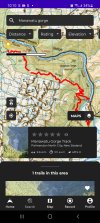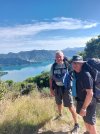MainelyStina
Chronic Overpacker
- Time of past OR future Camino
- Camino Frances from SJPP Starting Aug 21, 2023
Hey All!
So, I'm 40 days out from the start of my very first CF from SJPP (though I leave in about 34 days). I was hoping for a little (kindly) input on my training routes. I have two preferred routes that I like to use. One is right at 10km, is about half dirt/rock trail, half pavement, and according to my Apple Watch gains about 155m of elevation (this route is my favorite!) The second route is entirely pavement (minus maybe 250m on dirt trail?), lasts about 10.7km and gains only 85m of elevation. I am able to complete both routes without needing to take breaks, and I average right around 5km/hour (bit slower on the rocky hill climb...)
My question/concern is: am I getting enough hill training in or do I need to find some more hills?? (I don't live *that* far from the Appalachian Trail) I know I need to up my distances over the next 5 weeks, and I've done some walking with my backpack partially loaded (I may be switching packs - long story...) That said, I'm trying to give myself as much of an advantage as I can, with the time and resources I have, as I continue to prepare over the next several weeks.
Yesterday I did the 10.7km pavement route and then proceeded to stand on a moving motor coach for 7 hours (the life of a professional guide) - this morning I woke up with the PF in my right foot screaming - though I think that is primarily a function of bus standing and not walking. And please don't think I'm making excuses, but I'm currently working 6-7 days a week before I leave, so recurrent days of 6-8 hours of walking are pretty impossible, and even with shorter distances, unless I get out at about 6am before work, the weather here in south-central Pennsylvania is blisteringly hot and absurdly humid! (Even at 6am the other day the temp was over 70 and the humidity was 98%) I understand that we all have individual challenges - these just happen to be mine. But I was hoping for a bit of direction on where I should be heading before I finally leave.
Thanks to everyone - and apologies for the long post...
Stina
(PS: I LOVE the title suggestion function!!!)
(PPS: I do have a treadmill with incline and decline function - if that helps...)
So, I'm 40 days out from the start of my very first CF from SJPP (though I leave in about 34 days). I was hoping for a little (kindly) input on my training routes. I have two preferred routes that I like to use. One is right at 10km, is about half dirt/rock trail, half pavement, and according to my Apple Watch gains about 155m of elevation (this route is my favorite!) The second route is entirely pavement (minus maybe 250m on dirt trail?), lasts about 10.7km and gains only 85m of elevation. I am able to complete both routes without needing to take breaks, and I average right around 5km/hour (bit slower on the rocky hill climb...)
My question/concern is: am I getting enough hill training in or do I need to find some more hills?? (I don't live *that* far from the Appalachian Trail) I know I need to up my distances over the next 5 weeks, and I've done some walking with my backpack partially loaded (I may be switching packs - long story...) That said, I'm trying to give myself as much of an advantage as I can, with the time and resources I have, as I continue to prepare over the next several weeks.
Yesterday I did the 10.7km pavement route and then proceeded to stand on a moving motor coach for 7 hours (the life of a professional guide) - this morning I woke up with the PF in my right foot screaming - though I think that is primarily a function of bus standing and not walking. And please don't think I'm making excuses, but I'm currently working 6-7 days a week before I leave, so recurrent days of 6-8 hours of walking are pretty impossible, and even with shorter distances, unless I get out at about 6am before work, the weather here in south-central Pennsylvania is blisteringly hot and absurdly humid! (Even at 6am the other day the temp was over 70 and the humidity was 98%) I understand that we all have individual challenges - these just happen to be mine. But I was hoping for a bit of direction on where I should be heading before I finally leave.
Thanks to everyone - and apologies for the long post...
Stina
(PS: I LOVE the title suggestion function!!!)
(PPS: I do have a treadmill with incline and decline function - if that helps...)
Last edited:





















